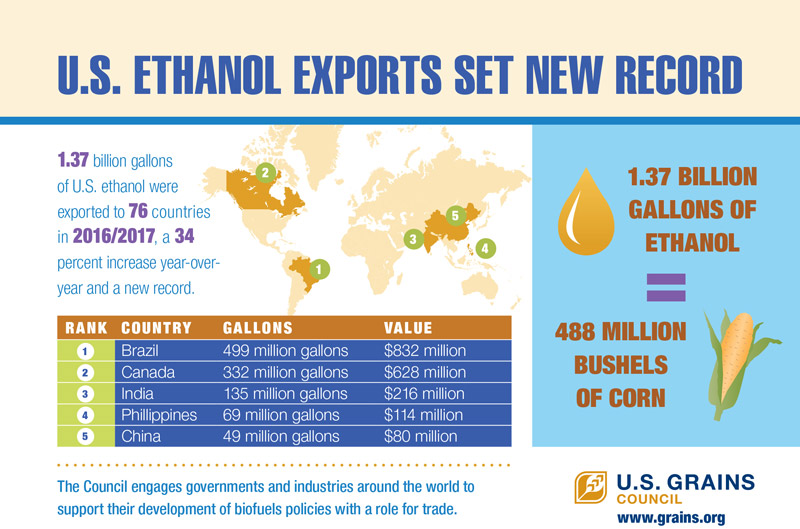Partnering with the Renewable Fuels Association, Growth Energy and USDA’s Foreign Agricultural Service (FAS) – and with support from the Market Access Program (MAP) program funds and state check-off contributions – the U.S. Grains Council has been able to help promote corn ethanol sales globally for a new export record in marketing year 2016/2017 of nearly 1.4 billion gallons.
Calendar year 2017 saw Council ethanol promotion programs in China, Japan, South Korea, Colombia, Peru, Canada, Mexico, India, the Philippines and Taiwan. Additionally, the Council provided public comments and scientific data on numerous foreign countries’ biofuel regulatory framework processes. The Grains Council also took up the fight to defend the U.S. ethanol industry on trade policy issues occurring in Brazil, Peru, Colombia, India and Mexico to ensure key markets remained open to exports of U.S. ethanol.
As a result of these efforts and the competitiveness of US corn-based ethanol in the marketplace, nearly 1.4 billion gallons of the biofuel (valued at $2.37 billion) were exported worldwide. Top customers included Brazil, Canada, India, the Philippines and China. This export figure beats the previous record of nearly 1.1 billion gallons exported in marketing year 2011/2012, before USGC developed an ethanol program. Additionally, the U.S. market share of total global ethanol exports jumped from 50 percent in 2016 to nearly 65 percent in 2017.
Increased ethanol exports have a direct impact on corn and sorghum farmers in the Midwest as they continue to face low commodity prices and depressed farm incomes. As global demand for U.S. coarse grains has remained relatively flat to slightly declining over the last decade, value-added products such as ethanol have increased returns for producers facing record supply of commodities worldwide. Ethanol has become a part of the portfolio of avenues by which grains are exported from the United States.
The ethanol program at the Council began in 2014 as a push to increase the exports of value-added coarse grain products. With the export share of U.S. commodities such as corn, sorghum and barley remaining stagnant or declining, it was imperative to explore new opportunities to market surplus corn stocks. As nations become increasingly more concerned with climate change caused by greenhouse gas emissions as well as air quality and its effects on human health, the Council has promoted the benefits of blending ethanol with fuel from environmental, human health and economics standpoints.
MAP funds accounted for nearly $2.5 million of the ethanol programming dollars last year. Given that the increased ethanol exports of 300 million gallons valued at $508.5 million, the return on investment (ROI) was $203 for every $1 of MAP invested.
About The U.S. Grains Council
The U.S. Grains Council develops export markets for U.S. barley, corn, sorghum and related products including distiller’s dried grains with solubles (DDGS) and ethanol. With full-time presence in 28 locations, the Council operates programs in more than 50 countries and the European Union. The Council believes exports are vital to global economic development and to U.S. agriculture’s profitability. Detailed information about the Council and its programs is online at www.grains.org.

